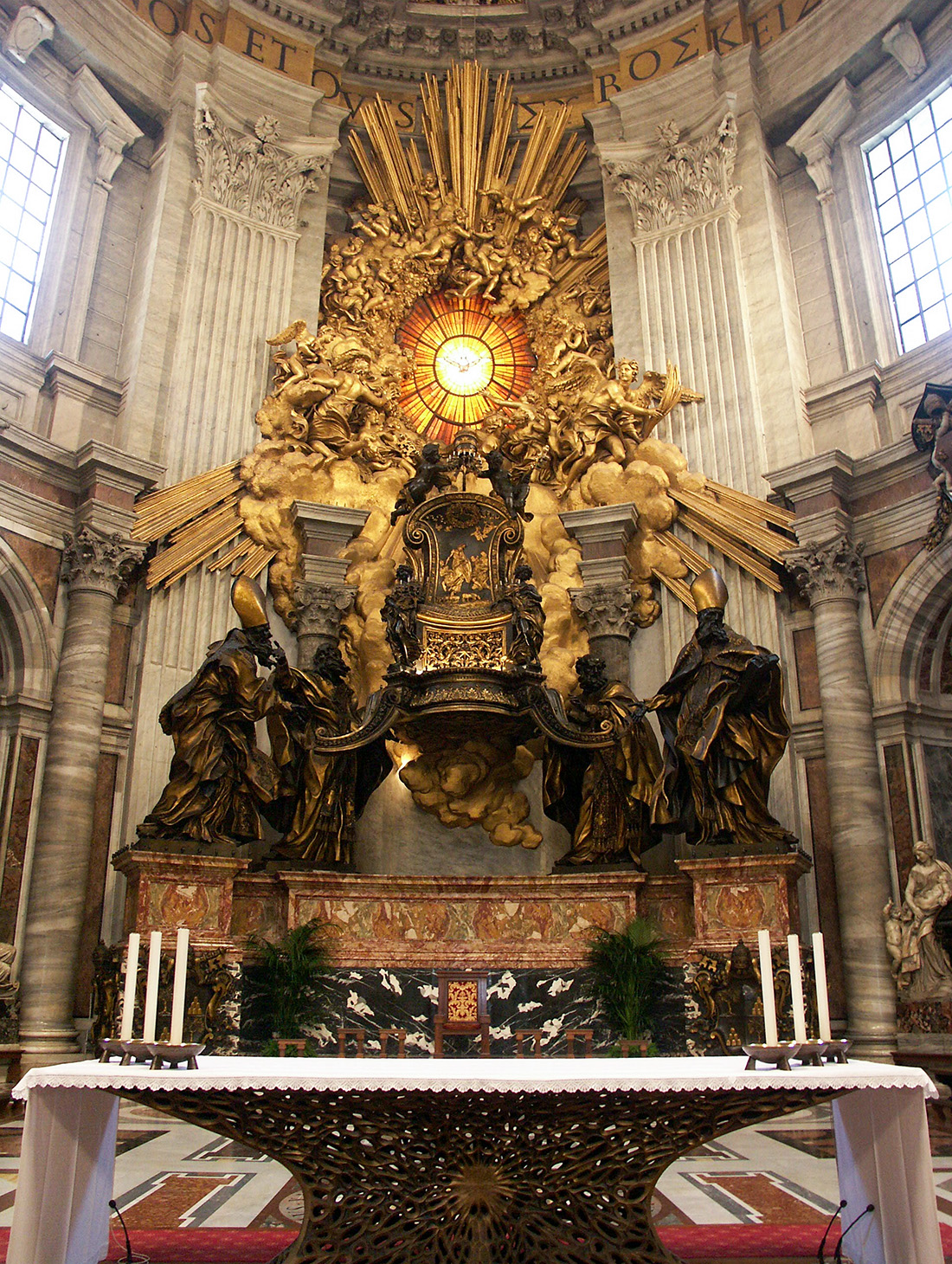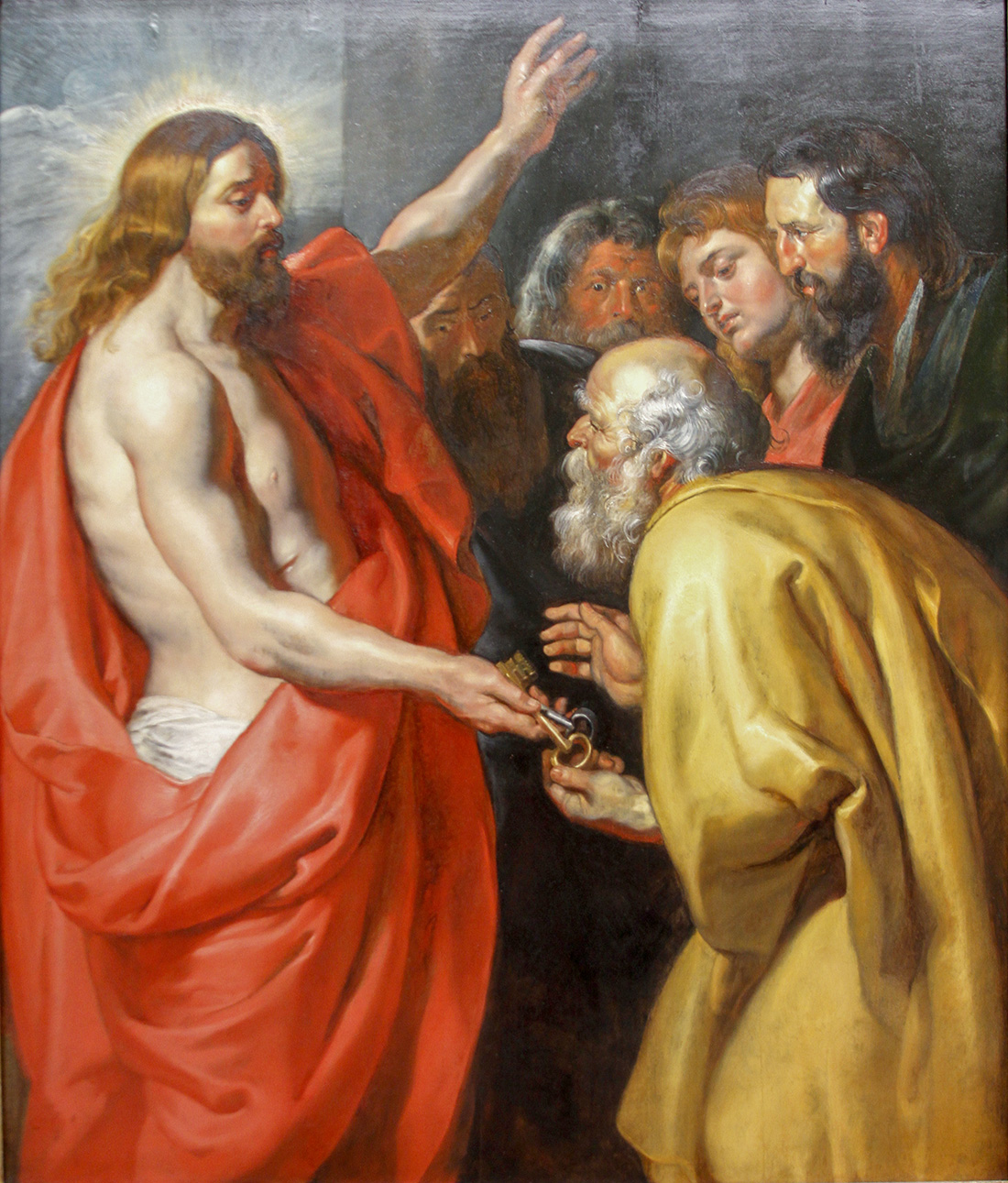Feast of the Chair of St. Peter: 1 Peter 5:1-4, Matthew 16:13-19.
Today the Church celebrates the moment when Christ entrusted His Church to a particular, flawed man. It is called the Feast of the Chair of St. Peter, and while there is an actual chair at St. Peter’s Cathedral in Rome said to be the one upon which Peter actually sat (although scientific dating shows the current chair to be no older than the 6th century), the feast is about much more than a relic. The chair is a type of throne, which symbolizes the earthly sovereignty of Peter over the Church, a position of authority that is passed to each Pope who occupies Peter’s Chair over the centuries. That last sentence is enough to make any dedicated Protestant writhe in consternation, I know. But Christ’s words (and the attestation of the other Apostles in other parts of scripture) are unequivocal. Rather than debate the merits of the papacy, I’d like to reflect on the astounding moment when Divine Will joined the mystical Church to our very earthly, undoubtedly flawed humanity.

Today’s gospel reading is that seminal moment when Simon Peter professes faith in Christ and Jesus bestows on him a new identity and the keys to the kingdom. When Simon Peter declares, “You are the Christ, the Son of the living God,” Jesus replies, “Blessed are you, Simon son of Jonah. For flesh and blood has not revealed this to you, but my heavenly Father.” Let’s consider how Jesus responds — it’s not “that’s right! you finally got it!” It’s an acknowledgement and declaration that the Father has finally blessed a particular person with the knowledge of the Son’s deepest identity. This foundational moment of the Church must be understood primarily within the relationship of the Trinity, where another human has been taken into their mystical embrace for the specific vocation of leading Christ’s Church in the time to come. As Fr. Erasmo Leiva-Merikakis writes in Fire of Mercy, Heart of the Word, Vol II, this moment is “an intimate communication among four persons — the Father, Jesus, and Peter, by the power of the Holy Spirit — in the presence of the whole assembly of the Church [i.e., the apostles gathered together that day]” (519). In other words, it was the Spirit that moved Peter to respond correctly to Christ’s questions, with a truth planted in him by the Father. Just as Mary is “blessed among women,” Simon Peter here is “blessed” among men to have been chosen by the Father and acted upon by the Spirit.
After He acknowledges the work of the Father and the Spirit in this man, Jesus declares: “And so I say to you, you are Peter [Petros], and upon this rock [petra] I will build my Church.” Peter’s new, God-given name is clearly meant to identify him as the foundation stone upon which any house must be built. Leiva-Merikakis asserts, “we must not overlook the fact that from the outset the Lord makes it crystal clear that it is he himself who remains supreme initiator, architect, and agent in the building of the Church, while Peter receives from Jesus the role of necessary instrumentality: he is the rock upon whom Jesus builds and the steward who, like Eliakim (cf. Is 22:21-22), receives from his master the administration of the keys to his house. By no means can Peter ever act on his own initiative, but only in the service and at the command of his Lord” (520). Simon has become a new man, joined in service by divine fiat. It is fitting that Matthew refers to him in this passage as Simon Peter, showing that the flawed human (Simon) remains but has been irrevocably joined to a new identity as the rock, the divine instrument of Church building.
To bolster Leiva-Merikakis’s assertion that Peter can only act “in the service and at the command of his Lord,” today’s first reading from the first letter of Peter passes along this same instruction to other elders (presbyters) of early Christian communities: “as a fellow presbyter and witness to the sufferings of Christ and one who has a share in the glory to be revealed: Tend the flock of God in your midst, overseeing not by constraint but willingly, as God would have it, not for shameful profit but eagerly. Do not lord it over those assigned to you, but be examples to the flock.” These are the words of someone fundamentally aware that a great trust has been placed in him over something that is not his but God’s alone. The Church, Peter understands, is Christ’s Church that He loves like a bridegroom loves his bride. That’s why the elders (presbyters) must “oversee,” not lead, and do so willingly, eagerly, and as an example of Christ for their flock. These are the words of a man who was blessed by God and stood face-to-face with his Messiah while he was entrusted with the growth of Christ’s Mystical Body on earth.
In the gospel reading, Jesus explains what the rock has been entrusted with: “I will give you the keys to the Kingdom of heaven. Whatever you bind on earth shall be bound in heaven; and whatever you loose on earth shall be loosed in heaven.” We have to be filled with a sense of wonder here at this seeming paradox, that any man, much less the headstrong and cowardly Simon Peter who denies his Lord three times during the Passion, would be entrusted with divine authority. The keys to the Kingdom of heaven! This means he can judge a person’s faith against the truth of faith revealed and admit or deny them access to the Kingdom We might think, OK, this might be the earthly experience of the Kingdom, but Jesus extends Peter’s authority to be binding in heaven as well as the earth. Leiva-Merikakis writes, “The declaration of such strict parallelism and equivalency of spiritual events on earth and in heaven, on the initiative and decision of a human being, would be utterly preposterous if it were not the Son of God speaking the words and guaranteeing the results. Only an incarnate God could confer such authority on a mortal, more specifically only and incarnate God who is to die and rise from the dead” (523). In other words, we can believe what Christ says because He actually demonstrates His mastery over death and His ascendency in Heaven. Anyone who wants to debate Peter’s worthiness or any individual pope’s worthiness is barking up the wrong tree. What’s at stake here is whether we accept our Lord’s own sovereignty to act as He sees fit, as Leiva-Merikakis says, “by bestowing on some human beings a participation in God’s own knowledge of truth and exercise of authority, for the common good of all and the salvation of the world” (524). Anyone who takes issue with this episode in the gospels is denying Christ that power and autonomy. We must remember to be humble servants and faithful children of God, especially when we don’t understand His ways. He is the only thing in the universe that commands our unfailing trust.

So, as we consider what the Feast of the Chair of St. Peter is all about, I think we should avoid glorifying Peter or any of his successors for their personal qualities (although many were saints and great men), but instead consider with wonder God’s amazing plan for humanity and the divine authority to enact it. Just as He deigned to have His Son be incarnate in the fragile form of a human for the sake of us all, He also deigned to entrust fallible humans with His infallible truth and authority for the sake of the building up of the Church. If we deny this reality, we deny a part of the Divine Will.
Let’s invite Leiva-Merikakis finish our reflection; he paraphrases Jesus’s commission to Peter: “I am making you to be Rock, and upon the solidity provided by this my choice and institution (and not so much by Peter’s personal faith) I will build my Church.” He continues, “It is, therefore, Jesus’ divine mandate that gives stability and continuity to the Church … Like the election of Israel, the motherhood of Mary, the event of the Incarnation, and the institution of the Holy Eucharist, the mandate to Peter cannot possibly have been of human invention. All of these mysteries cohere only in the divine economy of salvation and emerge solely out of the divine will and wisdom” (525).